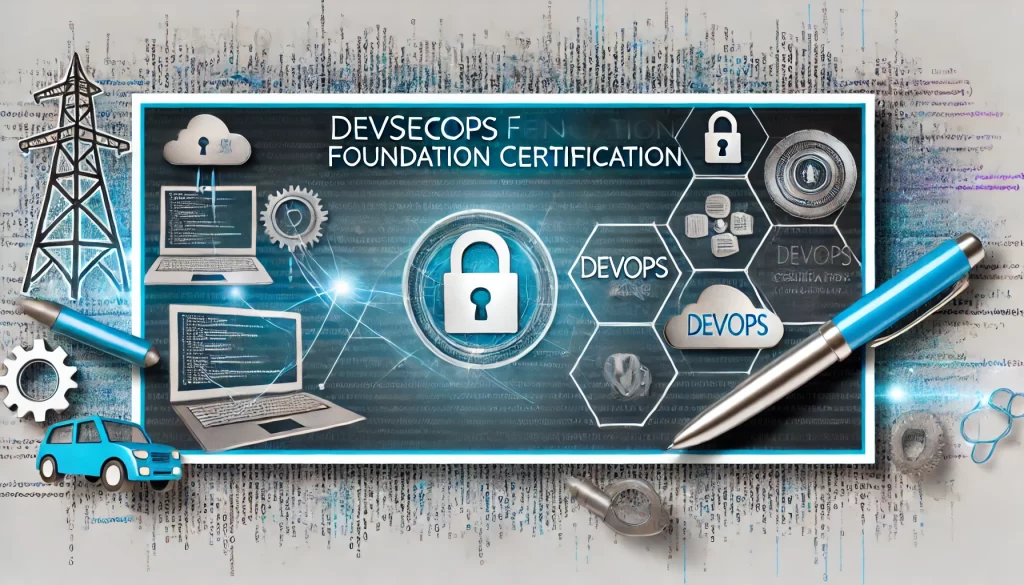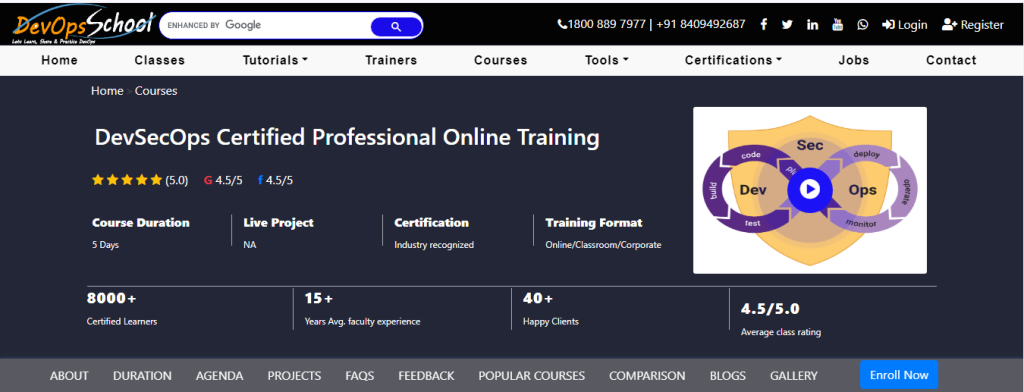
As businesses shift towards faster software delivery with DevOps, security must evolve to keep pace. Traditional security models no longer work effectively in a world where continuous integration and deployment are the norm. This is where DevSecOps comes into play, an approach that weaves security into every stage of the software development lifecycle (SDLC) without slowing down the delivery process.
To equip you with the skills and knowledge to excel in this crucial area, DevOpsSchool has introduced the DevSecOps Foundation Certification. This certification, in collaboration with renowned industry expert Rajesh Kumar from www.RajeshKumar.xyz, is your gateway to understanding how to secure development processes from the inside out, integrating security into the very fabric of DevOps.
Whether you are a developer, system administrator, security engineer, or an IT professional, this certification is designed to give you a comprehensive understanding of how security can be seamlessly integrated into DevOps workflows. In this detailed certification manual, we will explore all the critical sections, making sure you are prepared to ace the certification and apply DevSecOps practices in your organization.
What is DevSecOps?
Before we dive deep into the specifics, let’s define what DevSecOps really is and why it’s an essential practice for modern IT environments.
DevSecOps stands for Development, Security, and Operations. In essence, it integrates security into the core of DevOps, ensuring that security is no longer an afterthought but a continuous process embedded in every stage of the software development lifecycle. This is a game-changer in how organizations approach cybersecurity, shifting from traditional reactive models to proactive security solutions.
Why DevSecOps Matters in Modern IT
In today’s world, where new code is being pushed to production multiple times a day, the role of security has evolved. Old security practices that relied on manual testing at the end of development cycles simply can’t keep up with the fast-paced DevOps world. DevSecOps ensures that security is integrated without sacrificing the speed and agility of DevOps practices.
Benefits of DevSecOps:
- Faster, More Secure Delivery: Security checks are automated and built into the pipeline, enabling faster deployment without compromising safety.
- Proactive Security: Catch vulnerabilities early in the development phase before they reach production.
- Shared Responsibility: Developers, operations, and security teams collaborate more effectively, making security a shared responsibility.
- Reduced Costs: Fixing security issues earlier reduces the cost of vulnerabilities that could lead to breaches in production.
Who Should Take the DevSecOps Foundation Certification?
This certification is essential for anyone involved in modern software development, IT operations, or cybersecurity. It caters to a wide audience, including:
- Developers who want to learn how to incorporate security checks into their coding practices.
- System Administrators looking to secure infrastructure in a DevOps environment.
- Security Engineers seeking to understand the intersection of security and DevOps.
- DevOps Engineers eager to automate security throughout the entire development lifecycle.
- IT Managers and Project Leaders wanting to build a culture of security in their teams.
By earning this certification, you will validate your knowledge and skills in integrating security into fast-paced development environments, making you a valuable asset in any organization.
Agenda for DevSecOps Foundation Certification

This section will give you a detailed breakdown of the agenda covered in the DevSecOps Foundation Certification, designed to provide students with a well-rounded education in DevSecOps principles, practices, and tools. The agenda has been crafted to address real-world challenges, with hands-on approaches to mastering security in DevOps.
1. Introduction to DevOps and Security: Bridging Two Worlds
To start, students will get an introduction to the DevOps and Security worlds, understanding where these two fields intersect. We’ll dive into the history of DevOps, traditional security approaches, and how DevSecOps offers a modern solution to the growing demand for secure, scalable software.
Key Topics:
- Overview of DevOps: Principles of development and operations working together to deliver software faster.
- Challenges of Traditional Security: Why older security models don’t work in today’s fast-paced environment.
- DevSecOps Evolution: The shift from isolated security functions to a collaborative approach across all teams.
2. DevSecOps Principles: Building a Security-First Culture
Security isn’t just about tools—it’s a cultural shift. This section explores the foundational principles that drive DevSecOps and how organizations can build a culture where security is everyone’s responsibility. You’ll learn how security can seamlessly integrate into each phase of the CI/CD pipeline.
Key Topics:
- Security as Code: How to treat security like code, integrating it into every stage of development.
- Collaboration is Key: How to foster collaboration between development, operations, and security teams.
- Continuous Security Testing: Implementing security checks as a regular part of the development process.
- Shift Left Security: Moving security practices to the beginning of the development cycle, identifying vulnerabilities early.
3. Threat Modeling and Risk Management: Proactive Security Practices
Security is about anticipating and mitigating risks before they become problems. This section focuses on threat modeling and risk assessment, teaching students how to identify potential vulnerabilities early and develop proactive security solutions.
Key Topics:
- Threat Modeling 101: Learn how to predict potential vulnerabilities in your systems before they happen.
- Risk Management Framework: Prioritize risks and develop mitigation strategies.
- Automation for Risk Reduction: Discover tools to automate threat modeling and continuous risk assessment.
4. Secure Coding Practices: Writing Code with Security in Mind
The security of any application starts with the code. In this section, you’ll learn how to write secure code that minimizes vulnerabilities and adheres to best practices. By implementing secure coding practices early, you can drastically reduce the attack surface of your applications.
Key Topics:
- Code Reviews for Security: Best practices for reviewing code for potential vulnerabilities.
- Common Security Pitfalls: How to avoid common coding vulnerabilities like SQL Injection, Cross-Site Scripting (XSS), and Insecure Deserialization.
- Static and Dynamic Code Analysis Tools: Integrate tools like SonarQube, Checkmarx, and Fortify for continuous code scanning.
5. Automating Security in the CI/CD Pipeline: Faster, Safer Deployments
The heart of DevSecOps is automation. This section teaches you how to integrate security into your CI/CD pipelines without slowing down the process. Learn how to implement automated security checks that ensure code is safe before it reaches production.
Key Topics:
- Security Tools for CI/CD: Integrating tools like Snyk, Trivy, and Aqua Security into your pipelines.
- Automating Security Testing: How to set up automated tests that catch vulnerabilities in real-time.
- Security Gateways in CI/CD: Establishing security checkpoints to prevent unsecure code from being deployed.
6. Container Security: Keeping Docker and Kubernetes Secure
As more organizations adopt containers for their applications, understanding how to secure containerized environments is crucial. This section will teach you how to secure Docker containers and orchestrate Kubernetes environments to minimize the risk of breaches.
Key Topics:
- Container Image Scanning: Best practices for scanning Docker images to ensure they are free from vulnerabilities.
- Kubernetes Security: Secure your Kubernetes clusters and ensure that container orchestration is safe.
- Minimizing Attack Surfaces: How to lock down container environments and reduce the risk of attack.
7. Continuous Monitoring and Incident Response: Stay Ahead of Threats
Even with security in place, you must continuously monitor your applications and systems for threats. In this section, you’ll learn how to implement continuous monitoring practices that keep your systems secure, along with best practices for incident response.
Key Topics:
- Monitoring Tools: Learn how to use Prometheus, ELK Stack, and Splunk for continuous monitoring.
- Automated Incident Response: How to set up automated responses to security incidents to minimize downtime.
- Postmortem Analysis: Conducting blameless postmortems to learn from security incidents and improve your DevSecOps pipeline.
8. Governance, Risk, and Compliance (GRC): Ensuring Legal and Regulatory Adherence
Compliance is critical in today’s digital world. This section explores how to ensure your DevSecOps practices meet legal and regulatory standards, such as GDPR, HIPAA, and PCI-DSS.
Key Topics:
- Automating Compliance: Using DevSecOps tools to automate compliance checks and enforce security policies.
- Auditing and Reporting: How to generate reports for compliance audits.
- Ensuring Governance: Building security frameworks that satisfy industry regulations without compromising speed.
What Will You Learn in DevSecOps Foundation Certification?
By the end of the DevSecOps Foundation Certification, students will be able to:
- Implement Security as Code: Integrate security at every stage of the CI/CD pipeline, ensuring security is part of the process.
- Proactively Address Threats: Conduct threat modeling and risk assessments to identify and mitigate vulnerabilities before they reach production.
- Automate Security Checks: Use automation tools to perform continuous security testing without slowing down development.
- Secure Containers: Learn how to lock down Docker and Kubernetes environments, ensuring containerized applications remain secure.
- Ensure Compliance: Build systems that not only adhere to security best practices but also meet legal and regulatory standards.
Certification Exam Details
Upon completing the course, students can take the DevSecOps Foundation Certification exam to validate their skills. The exam format typically includes:
- Multiple-choice questions that cover all the key topics discussed in the course.
- Duration: 90 minutes, designed to test your understanding of the principles and tools of DevSecOps.
- Passing Criteria: Set by DevOpsSchool, ensuring you have mastered the material.
- Certification Award: Once passed, you’ll receive the official DevSecOps Foundation Certification, a globally recognized credential that will set you apart in the job market.
Meet Your Trainer: Rajesh Kumar
The course is led by Rajesh Kumar, a seasoned professional with decades of experience in DevOps and security. Rajesh has worked with top-tier organizations to implement DevSecOps best practices, making him one of the most trusted names in the industry. Under his guidance, you’ll receive not just theoretical knowledge but also practical insights that you can apply to real-world challenges.
For more resources and training, visit www.RajeshKumar.xyz.
Why Choose the DevSecOps Foundation Certification?
In a world where security threats are becoming increasingly sophisticated, mastering DevSecOps is critical. This certification offers you a fast track to becoming an expert in securing modern development pipelines without compromising speed or agility.
Key Benefits of the Certification:–
- In-demand skills: With security becoming a top priority for organizations, professionals who can integrate security into DevOps pipelines are in high demand.
- Career Growth: This certification opens doors to roles such as DevSecOps Engineer, Security Architect, and Automation Engineer.
- Real-world Knowledge: You’ll gain hands-on experience with the tools and techniques used by leading organizations to secure their software delivery pipelines.
- Global Recognition: As a DevSecOps-certified professional, you’ll be recognized globally as someone who understands the importance of security in modern software development.
Conclusion
The DevSecOps Foundation Certification is more than just a learning opportunity—it’s a pathway to mastering the intersection of security, development, and operations. In today’s rapidly evolving digital world, securing applications and infrastructure is critical, and this certification equips you with the tools and knowledge to do just that.
Whether you’re an experienced IT professional looking to upskill or a newcomer eager to break into the DevOps and security space, this certification provides a comprehensive guide to embedding security into every aspect of your workflow. Take the next step in your career by enrolling in the DevSecOps Foundation Certification today!